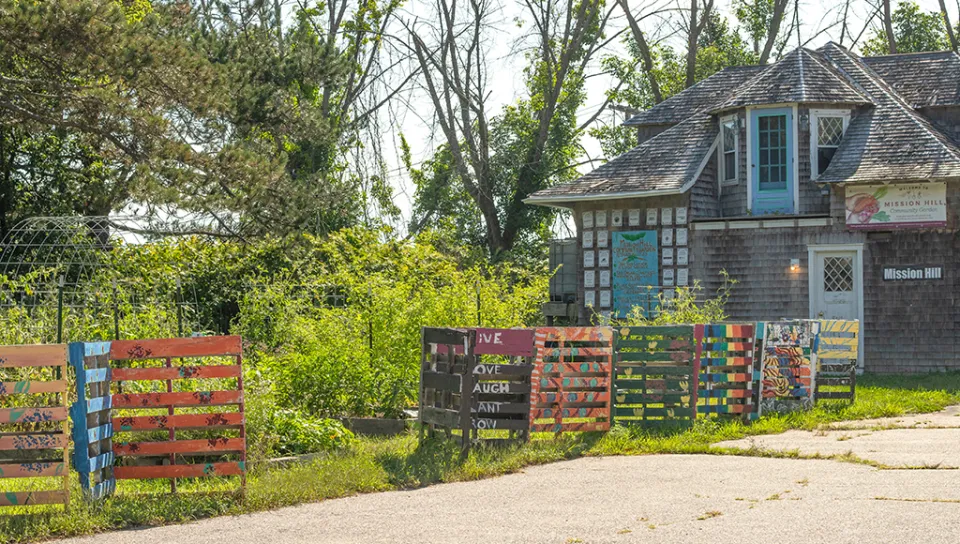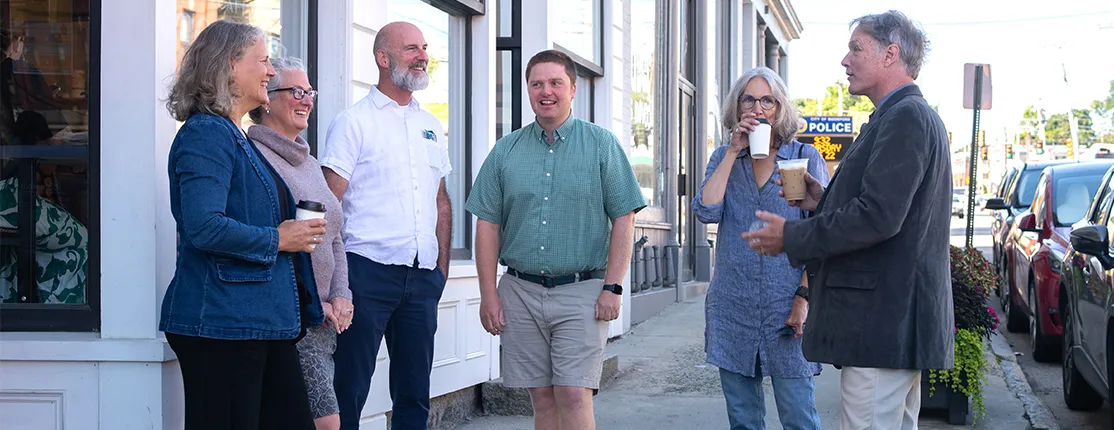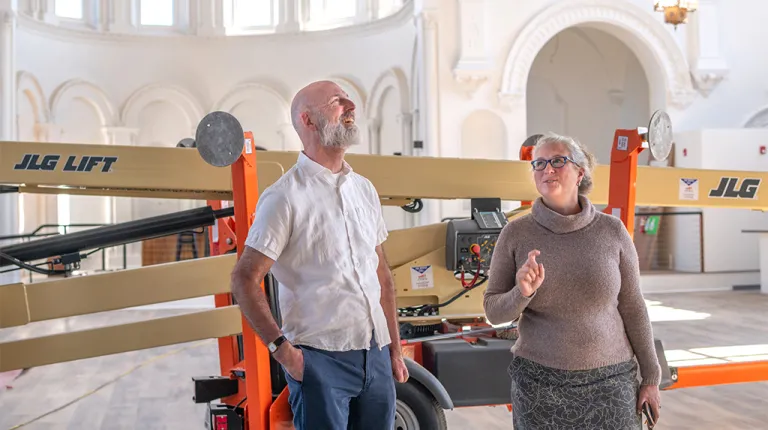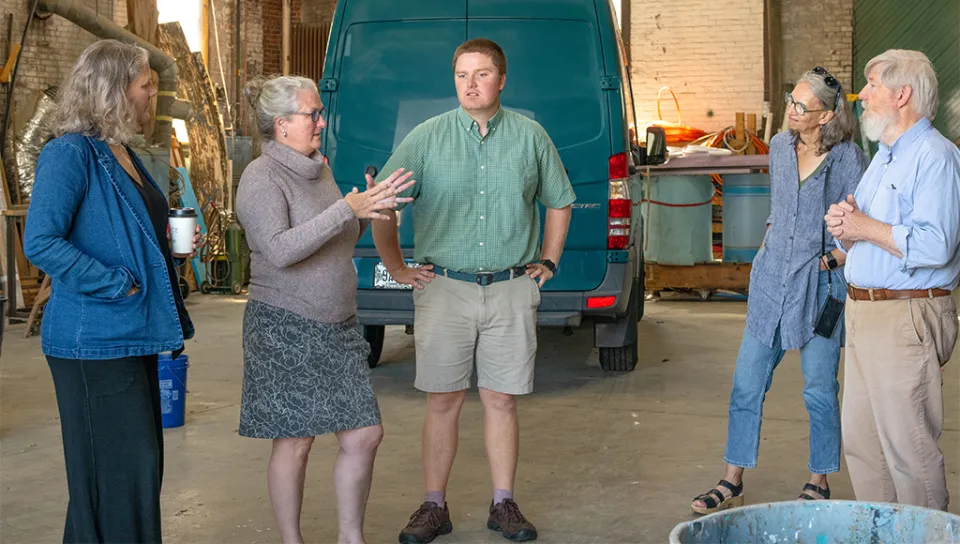UNE North and Biddeford Leaders Address Climate Resilience
by Deirdre Fleming Stires
UNE North and local Biddeford partners join forces to address the city’s urban core climate resilience.
In his first year as director of UNE North, a University of New England center that facilitates partnerships across the North Atlantic to address social, environmental, and economic challenges in the region, Cameron Wake, Ph.D., looked to forge alliances close to home — very close to home.
The past year, Wake worked to make Biddeford’s low-resource, urban core more climate resilient with the city of Biddeford, the local nonprofit economic development organization Heart of Biddeford (HOB), UNE’s Center for Excellence in Public Health (CEPH), the Biddeford Housing Authority, and several other local and University partners.

Left to right: Brad Favreau, City of Biddeford; Delilah Poupore, Heart of Biddeford; Cameron Wake, UNE; Will Kotchtitzky, UNE; Alethea Cariddi, UNE; and Michele Polacsek, UNE.
“What we’re doing is helping to nurture and create community, not traditionally a role that a university plays. And yet, if you asked me what UNE North is — that’s it,” Wake said.
Biddeford has a historic mill district along the Saco River that has metamorphosized over the past several years into a hip tourist destination lined with hotels, restaurants, and shops owned by eclectic artisans. In 2022, Food & Wine magazine named Biddeford — what some call “the new Portland” — one of just four small American cities with a big foodie scene.
Downtown Biddeford is also home to a densely populated neighborhood rife with air pollution and cramped, sub-code apartment buildings that lack reliable, energy-efficient cooling and heating sources.
These older neighborhoods, said Delilah Poupore, HOB executive director, share a common spirit rooted in kindness, generosity, and a mutual respect passed down through generations of French-
Canadian families.
“This is a close-knit community with neighborhoods that were left behind in the economic revitalization of the last decade,” she said. “People in Biddeford are often referred to as scrappy. They make things work, even if the conditions aren’t always the easiest.”
It’s here that the new team of advocates hopes to turn the disadvantaged neighborhood into a healthier community.
“We’re focusing on the challenges that society is facing and engaging our students, faculty, and professional staff in addressing those challenges instead of purely academic interests. The only way this can happen is if everybody pulls in the same direction,” Wake said.
The local community group seeks to fund creative, climate-friendly improvements, such as adding solar panels and heat pumps to low-income apartments, painting the roofs white, and redesigning streets with tree-lined boulevards for shade. They would add free electric bikes, an electric vehicle sharing program, free electric-bus transport, installing many more electric vehicle charging stations (including on the waterfront to charge electric boats) and a renovated community center that would also serve as a resilience hub, providing critical resources during heat waves and other natural disasters.
All told, the climate justice initiative would improve air quality while reducing pollution and greenhouse gas emissions, reducing energy costs, and providing air-conditioned apartments and community centers in Biddeford’s downtown corridor.




Then, once the infrastructure is in place, the Center for Excellence in Public Health would study the impact of the climate resiliency work in partnership with the Heart of Biddeford, the Apex Youth Connection, the Biddeford Housing Authority, the Southern Maine Planning and Development Commission, UNE faculty, and students, among others.
“It’s the perfect partnership to build infrastructure, measure impact, and then scale and write and disseminate the results,” said Michele Polacsek, Ph.D., M.H.S., director of CEPH at UNE. “City governments are not in the position to go around the country talking about a great model, but, through publication and presentations, university faculty are — because that’s their job. So, it’s a really great way to do this work.”
Key to the collaboration between these climate and public-health advocates is applying for significant grant funding — grants that could completely transform Biddeford’s low-resource neighborhood into a more sustainable and supportive community hub, one that relies less on fossil fuels and provides cleaner indoor and outdoor air for the people who live there.
Last spring, the team, led by Wake, applied a full-court press to one such grant application, an effort that culminated in the Biddeford City Council’s unanimous endorsement on July 16 — and a round of applause from the public gathered in the council chambers.
“That never happens,” Poupore said. “But people are kind of dying for good news about climate change. People worry about what they’re being told to do ... It’s about trying something together. I think that’s what people were clapping about.”


Enhancing climate resilience is vital, especially as the government launches grant programs like the Environmental Protection Agency’s Environmental and Climate Justice Community Change Grant program, which allocates $2 billion over the next three years to assist communities disproportionately impacted by climate change and the pollution from past industries.
As of October, funding for Biddeford’s climate justice initiative remained unknown. But even if the newly formed team of advocates don’t land a major grant immediately, Wake is not giving up on what he calls “the beginning of a broader collaboration.”
“You can do things in smaller population centers that you can’t do in New York City. Here, we can build a model for what has to happen, how you make it happen, and learn what the health, environmental, and cost impact might be. It’s a pilot that we can study,” Polacsek said.
Wake came to UNE after a 36-year career at the University of New Hampshire, where he led some 25 mountaineering expeditions to Central Asia and the Arctic to drill ice cores and study ice core paleoclimatology, much of that work funded by the National Science Foundation. He came to UNE, he said, for “the opportunity to integrate climate change, sustainability, and the health professions, which is a really big need.”
In the past year, Wake helped create a program for Summer Sustainability Fellows that matches students with mentors at businesses and organizations, and he is one of the drivers behind the new Maine SeaMade Bars initiative, which engages students across various disciplines in all aspects of supply chain, production, marketing, and sales, including harvesting kelp — a primary ingredient in the sustainable energy bars — in Saco Bay. He also traveled to the Arctic region to further and forge alliances there.
But the real groundbreaking catalyst for change Wake hopes to facilitate is the work arming the disadvantaged areas of Biddeford for the climate crisis.
“We could have focused on many other communities across Maine,” Wake said. “But what we decided as a team was that, if we focused on downtown Biddeford and embraced a number of different climate action strategies and pollution-reduction strategies, this could be really transformative for this city that is already a phoenix rising from the ashes.”
On the other hand, if fully funded, the team’s climate justice proposal — which includes half of the 48 measures in the city’s climate action plan — would elevate Biddeford as a regional leader in the fight on climate change, said Biddeford Economic Development Coordinator Brad Favreau.
“We were among the first to declare a climate emergency, and other Maine communities have asked us for advice on how to do this,” Favreau said.
